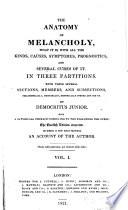Quotes from book
The Anatomy of Melancholy

The Anatomy of Melancholy is a book by Robert Burton, first published in 1621, but republished five more times over the next seventeen years with massive alterations and expansions.

“Diogenes struck the father when the son swore.”
Section 2, member 2, subsection 5.
The Anatomy of Melancholy (1621), Part III

“Seneca thinks the gods are well pleased when they see great men contending with adversity.”
Section 2, member 1, subsection 1.
The Anatomy of Melancholy (1621), Part II

“Diogenes struck the father when the son swore, because he taught him no better.”
Section 2, member 1, subsection 5, The last and best Cure of Love-Melancholy, is to let them have their Desire.
The Anatomy of Melancholy (1621), Part III

“Why doth one man's yawning make another yawn?”
Section 2, member 3, subsection 2, Of the Force of Imagination.
The Anatomy of Melancholy (1621), Part I

“Marriage and hanging go by destiny; matches are made in heaven.”
Section 2, member 2, subsection 5.
The Anatomy of Melancholy (1621), Part III

“The miller sees not all the water that goes by his mill.”
Section 3, member 4, subsection 1.
The Anatomy of Melancholy (1621), Part III

“The Devil himself, which is the author of confusion and lies.”
Section 4, member 1, subsection 3.
The Anatomy of Melancholy (1621), Part III

“Cookery is become an art, a noble science; cooks are gentlemen.”
Section 2, member 2, subsection 2.
The Anatomy of Melancholy (1621), Part I

“Like him in Æsop, he whipped his horses withal, and put his shoulder to the wheel.”
Section 1, member 2, Lawful Cures, first from God.
The Anatomy of Melancholy (1621), Part II

“No cord nor cable can so forcibly draw, or hold so fast, as love can do with a twined thread.”
Section 2, member 1, subsection 2, How Love tyranniseth over men. Love, or Heroical Melancholy, his definition, part affected.
The Anatomy of Melancholy (1621), Part III